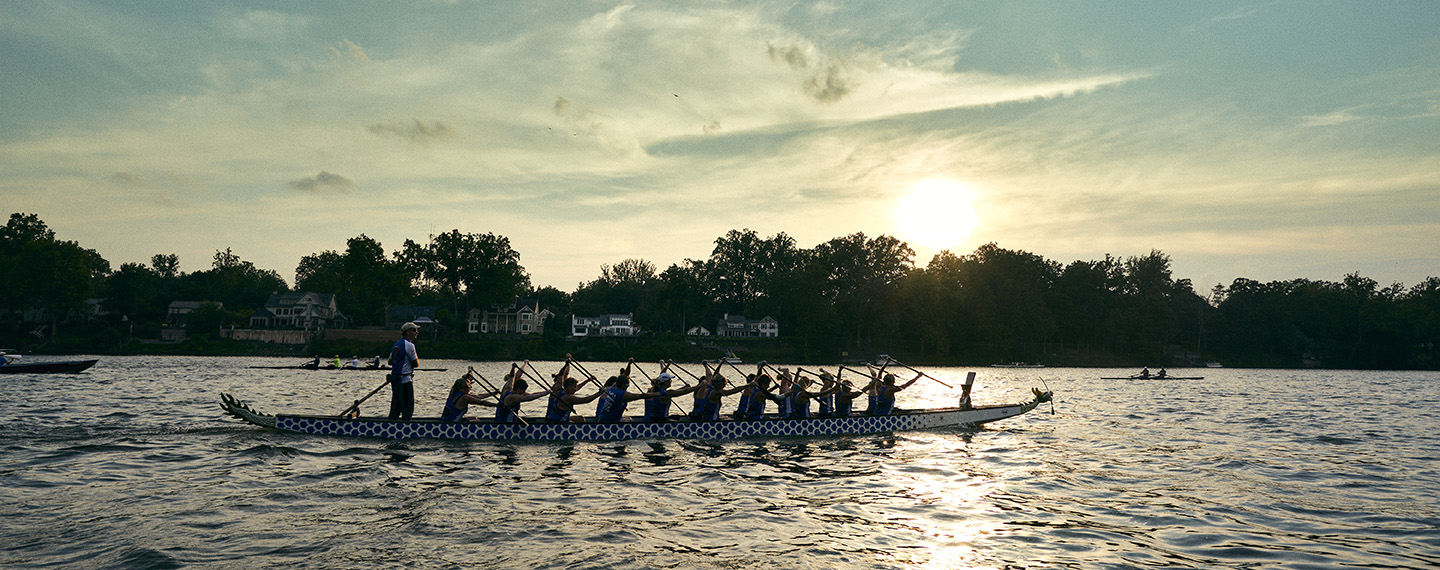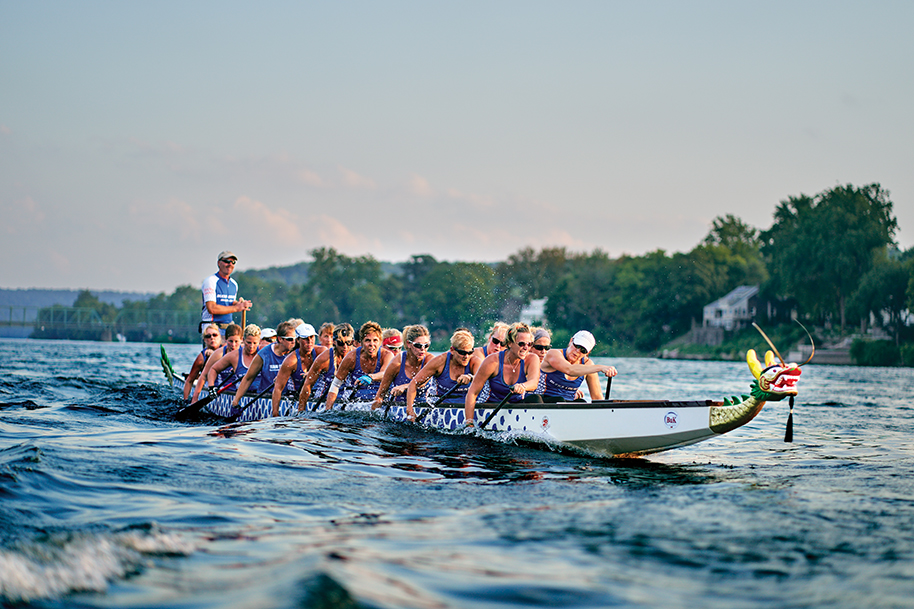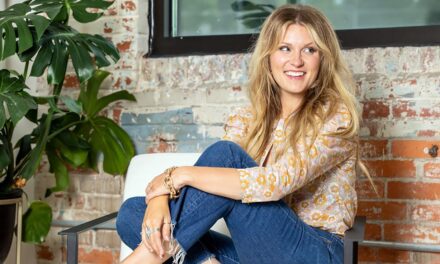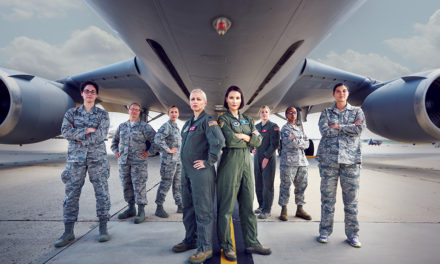The Bucks County Blazing Dragons Fusion crew started paddling together as a collection of more than 30 women, vying for 20 seats on a dragon boat to compete in the national championships. And when we crossed the final finish line, we were champions.
Laurie McHugh leans in from the drummer seat perched on the bow of the dragon boat and surveys the 20 faces in front of her like a general assessing her troops before battle. She adjusts her headset and offers us a wry smile. We are about 300 meters from the start of the race that will define the success of our entire season—the intensity of the moment is almost smothering—and she absolutely loves it.
We head down Mercer Lake in West Windsor, NJ, this year’s location for the U.S. Dragon Boat Federation’s Club Crew National Championships, bellies full of butterflies and eyes focused on the task at hand—winning back-to-back national titles.
Ostensibly, the drummer’s job during the race is to set the cadence of the paddles to help her team, Bucks County Fusion, stay in sync, pounding out the beat on an 18-inch drum. But McHugh, like many drummers, is the heart of her team, coaxing out courage and power from the women in front of her when these are required to win.
From the rear of the boat, our steerswoman, Jan Buhler, gives us the command: “Paddles up. Go!” All 20 paddles—10 on the right and 10 on the left—shoot up and drop into the water in near-perfect synchronicity. The boat is quiet—only the sounds of the paddles slicing into the water and our staccato breathing interrupt the wild hammering of our hearts.
“I want all eyes in this boat,” McHugh says. “This is it. This is what you trained for. Everything you’ve done in your lives comes down to this moment. We are Bucks County, and this is our water. This is our race.”
It’s been 3 months since we were asked to become “Fusion hopefuls.” Some of us heard from Greg Chang, the coach who led the team to a Nationals win in Chicago in 2015 and a dragon boat athlete himself. Others got calls from Laura Kent, a teammate who embodies the sport. Fusion hopefuls were tapped for additional training and an opportunity to win a seat on the boat that the Bucks County Blazing Dragons were sending to the biannual event. It meant more practices, learning a completely new stroke, and committing to conditioning our bodies throughout the entire summer.
The ensuing months weren’t always smooth sailing. Some of us struggled with the new technique—a longer, slower stroke that was intended to bring more power. Coach said we weren’t getting low enough or reaching far enough. Some of us weren’t locking our elbows or sitting up tall upon the return. “I keep telling you guys, you should be long,” Chang would say. “You should be ripping through the water. If it’s too easy, you’re not doing it right.”
We paddled up and down the Delaware with Chang riding alongside in the chase boat with McHugh, instructing, critiquing, and commanding us to do it all again and again. “Downey—lock your elbow!” “Petrosky—you’re overextending!” “Bowe—not low enough!” “Do it again!” We paddled 200-, 500-, and 2000-meter race simulations in the August rain—once in a storm that came on so suddenly we battled ferocious whitecaps to get back to the dock before the thunder and lightning were upon us. And we spent hours reviewing video of team practice in order to stamp out the flaws in our form.
And, after all that, it all comes down to the next 60 seconds.
Sometimes during practice, I’m thinking, ‘My hips are hurting; my traps are killing. I’m hot. I’m freezing. I’m wet.’ The races are long. You train and train, and you basically race 3 times for 10 minutes. But I’m totally loving it.
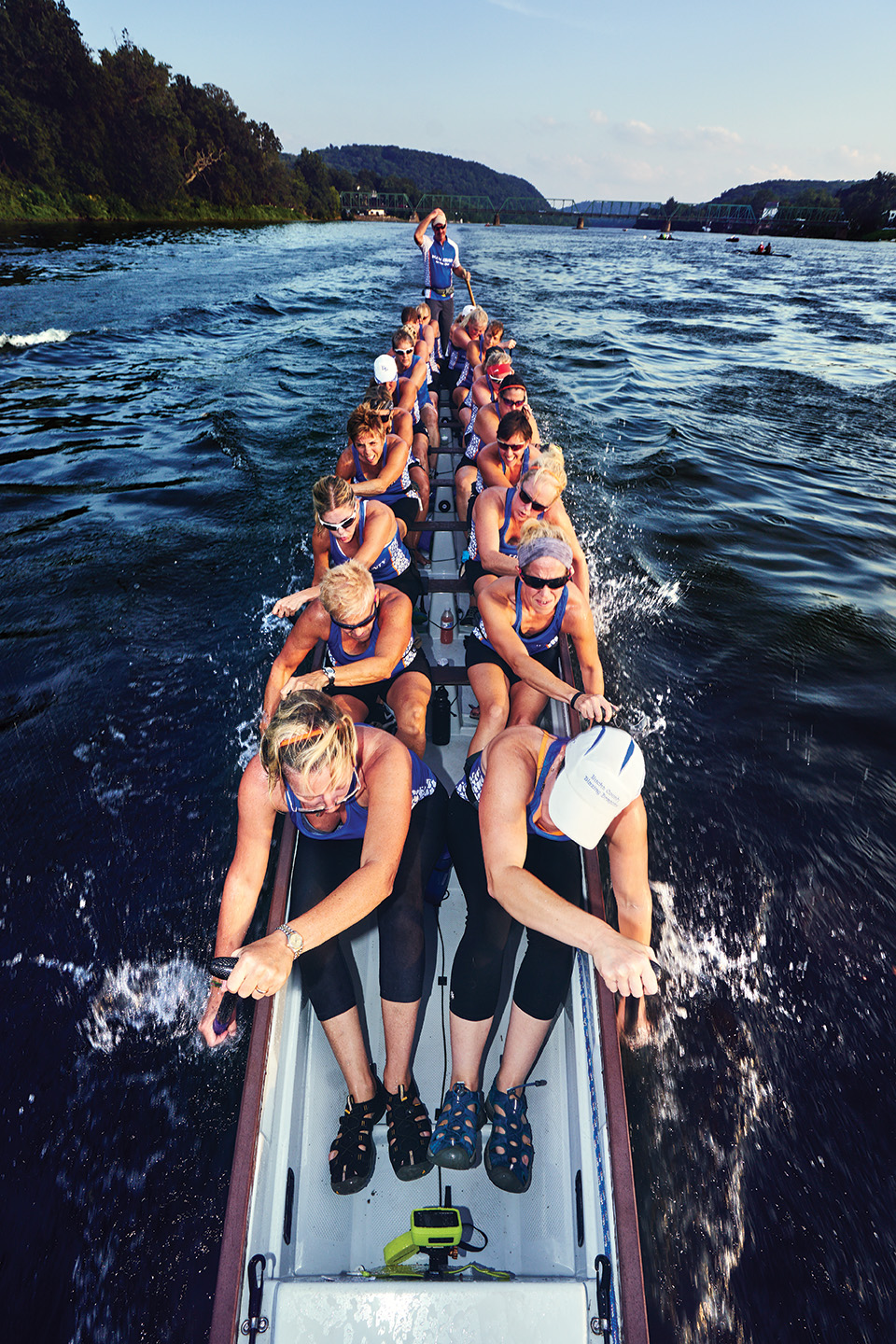
Dragon Boat gives me the opportunity to compete with women who work together to make something truly incredible happen.
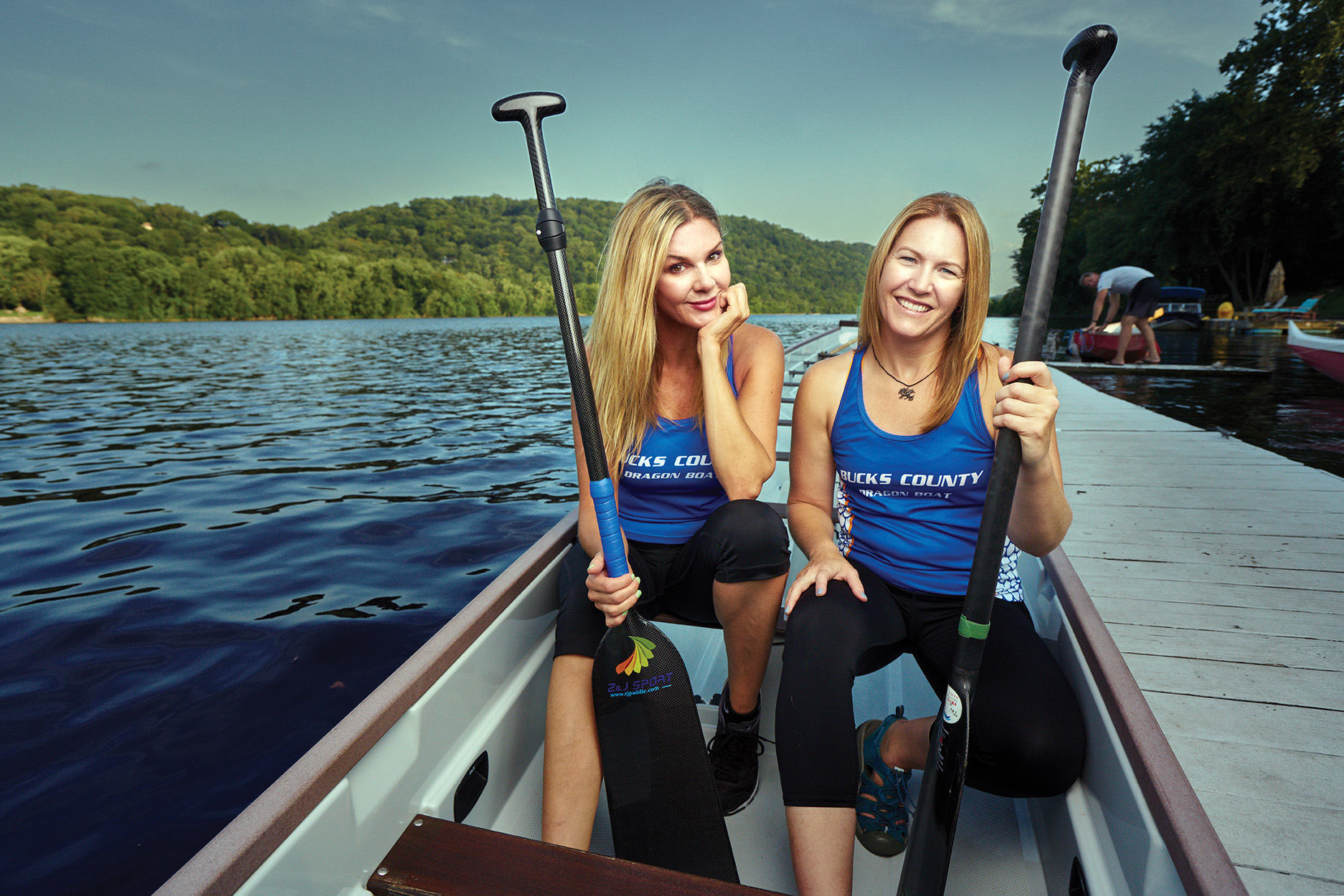
Co-captains Kim King and Gwen Coverdale
Ready for Anything
McHugh reminds us to breathe, to bury our blades in the water at the start, to follow the race plan, and to trust ourselves. There’s no room in this boat for doubt, she says. In the third race of day 2, we are 200 meters away from a national title and a berth at the International Dragon Boat Federation Club Crew World Championships in Szeged, Hungary, in 2018, and nothing is going to stop us. She pauses to let us take in her words, to feel the sun on our faces. Then she scans her 20 warriors again and says, “During this race, when I tell you to give me a seat, you have to dig deeper than you’ve ever dug before. You may not have anything left, but you’re going to find it, and you’re going to give it to me.” We nod like marionettes because we know we will do it for her. For each other. For ourselves.
The announcer calls us up to the line—just 20 meters away now—so that all seven boats can launch together. “This start is going to be fast. Get your blades buried and give me everything,” McHugh says.
We paddle forward, hold water, drift ahead, paddle back, and hold again until all boats are in perfect alignment. For an infinite moment, everything is perfectly still, as our muscles twitch and burn, ready to burst into action.
“We have alignment. Attention. Attention!” And then the horn sounds, and all 20 Fusion paddlers pull as much water as their bodies will allow for five long, heavy strokes, to get the 550-pound dragon boat moving. We paddle faster for five strokes. Then faster for another five. And faster still. The pace feels frenetic, even though it’s exactly according to plan, and 30 seconds into the race our bodies scream for oxygen. But we’re still neck-and-neck with Malia Paddling and Racing Club of Vermont, the team that beat us by a fraction of a second in the prior heat, the team we need to beat to win. “Come on, Fusion! You’re better than this!” McHugh shouts over the speaker that runs through the length of the boat. “Give me a seat! I want more! Give. Me. More!”
The adrenaline surging through us is mercifully masking the aches and pains—the chafing on my backside that comes from rocking back and forth on a wooden dragon boat seat, the rotator cuff injury that still nags a teammate, and everyone’s sore back that results from the jerky motion as we lean over the gunnel and rip through the water again and again. From the sidelines, dragon boating may look like simple paddling, but it actually requires just about every part of the body in order to do it well—leg drive, core engagement, and arm and shoulder strength.
Yet, we ignore our aching bodies and our minds telling us that we’re tired, and we listen to our drummer—our champion—to find the will to dig a little deeper into the river and into our souls until the finish is right before us.
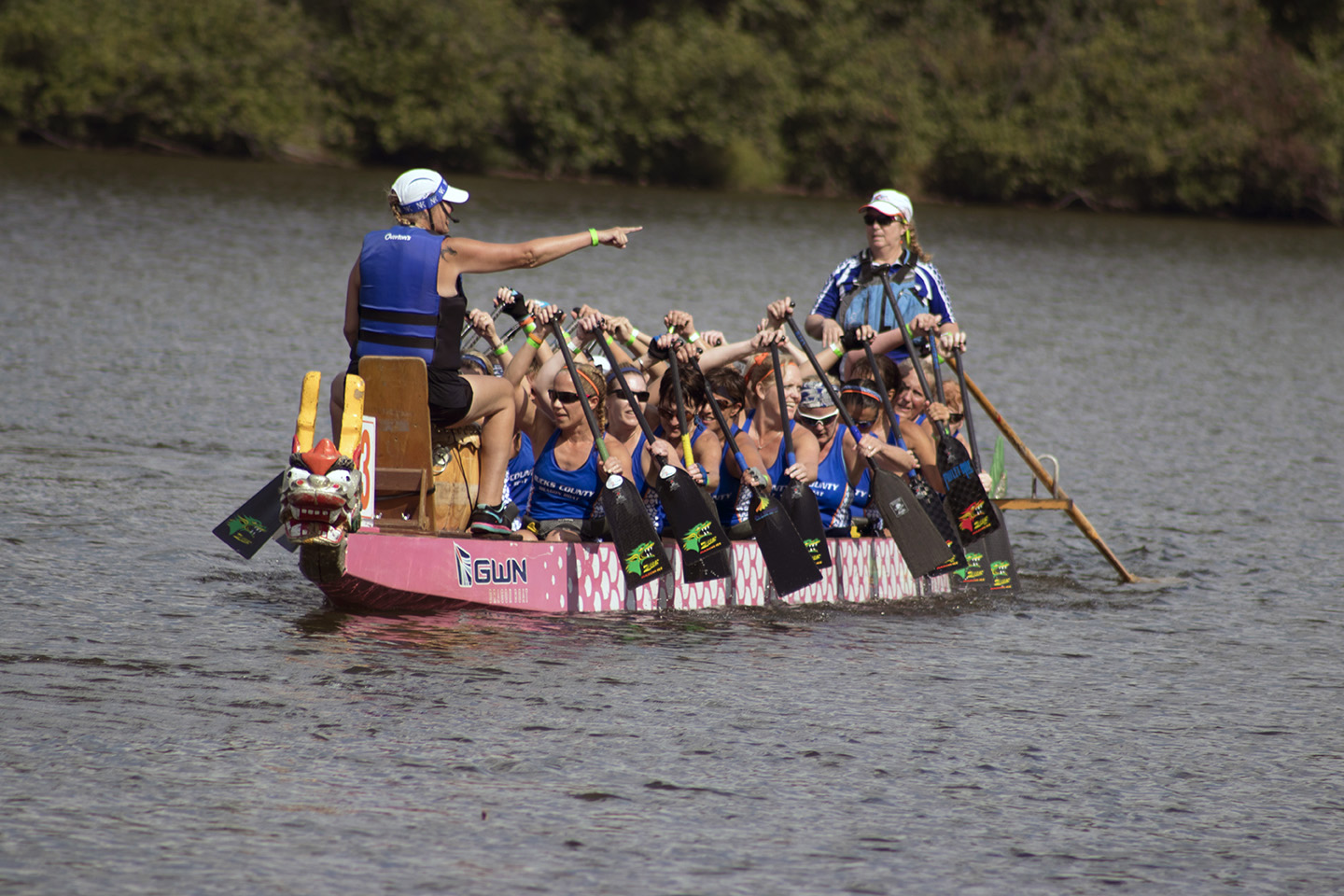
It All Comes Down To This
One athlete’s thoughts the night before Nationals
On the eve of the biggest sporting event of my life, competing as part of the Bucks County Dragon Boat Association women’s team in the U.S. Dragon Boat Federation’s Club Crew National Championships, I can’t stop thinking about how we negatively judge ourselves. We compare ourselves to where we think others are, often based on the snapshot of their lives on social media. We beat ourselves up for not being there, too. With race day a few hours away, I’d rather think about how far we’ve come.
Several years ago, I let my physical health take a backseat to everything else. I was a longtime smoker, and a doctor once warned me that, based on my body mass index (BMI), I was borderline obese. I used to let that define me, as if I was powerless to be anything more. Then I started making better choices and, eventually, dove into what’s become my regular yoga practice. This practice helped me build the lung capacity and muscular strength I’d need to take up running regularly in my mid-30s.
Two years ago, while feeling depressed after falling and breaking my leg on a run, I discovered a sport I never knew existed—dragon boat racing. I saw a post for an informational meeting at BCDBA and figured, What the hell? My arms still work. That’s when I met an inspiring group of women who exemplify how far you can go with hard work, grit, and determination—no matter where or when you begin. And I’ve never felt more badass in my life.
So, instead of beating ourselves up for not being where we think we should be in our jobs, our fitness, and in our personal lives, let’s pause and reflect on how far we’ve come. Let’s appreciate where we are now. Even if it’s a totally different place than we’d planned. And maybe we can let that serve as a reminder that wherever we are now is just one step on our journey to places that may be much bigger, brighter, and more badass than we ever imagined.
Becoming national champs will be a rewarding recognition for the hard work it took to get here. But the journey itself—how far we’ve come—that’s the true accomplishment.
—HOLLY BARBERA
We Become One
From the start of the race, we are paddling in near-perfect synchronicity, a trait in dragon boating that’s almost more important than anything else. If just one paddler misses a stroke or falls out of alignment, the boat will drop like cement. Three weeks ago, Fusion’s first race at the Dragon Boat Regatta in Washington, DC, was dismal, and it showed in our finish time. We all saw it on McHugh’s Go Pro video—we were completely out of sync. And that kind of synchronicity takes more than practice; it comes from trusting each other—following the first row of paddlers for timing, listening to the drummer for powerups, and accepting reminders from teammates to keep your chin up and your paddle buried in the water.
Throughout the season, the 30 of us, ranging in age from 40 to 63, all bring our own motives and intentions into the boat every practice and race, and gelling as a team was sometimes elusive. “As women, we juggle so many things—family, house, work—and we’re giving up a lot to make this commitment,” says co-captain Kim King, 48, of Doylestown, Pa. What initially started out as a way for her to get sculpted shoulders quickly turned into a passion, a drive to win, and a desire to be a crucial part of a competitive team. “Sometimes, during practice, I’m thinking, My hips are hurting; my traps are killing. I’m hot. I’m freezing. I’m wet,” she says. “The race days are long. You train and train, and you basically race for a total of 10 minutes. But I’m totally loving it. All of it.”
Like most of the women in the boat, King discovered dragon boating only recently, in 2014, and she was hooked right away. Dragon boat racing, a major sport in many Asian countries, is growing in popularity in the United States—it’s the second-largest sport in the world today, trailing just behind soccer. In 1976, dragon boat racing first emerged as an international sport, but its history reaches back to the same era as the original Olympic games in Ancient Greece.
Dragon boating is King’s first experience playing organized sports as part of a team. And she’s not alone. In fact, for many of her teammates, dragon boating represents their first major athletic endeavor. “Dragon boat gives me an opportunity to compete with women who work together to make something truly incredible happen,” says co-captain Gwen Coverdale, 43, from Doylestown, Pa., who has been paddling for 7 years. Over the course of a summer season, new paddlers who aren’t sure how to hold the paddle in April can become strong assets to the team by September, with the right coaching and hard work. “It’s amazing to see how empowering dragon boating can be, particularly for women who may not have been athletes in their youth but now have the chance to compete in adulthood at a high level,” says Coverdale.
As a member of the 2015 Bucks County Fusion team that won Nationals in Chicago, Coverdale says she relished the opportunity to be a captain and give a new group of women the experience of coming together as a team and competing for a gold medal. “I’ll never forget what happened in Chicago. It was tough competition, but something came over us in the third race. It was otherworldly,” she says. “We all tapped into something that we didn’t know we had in us. We laid everything out there on the water. When we got to our finish call, we were like a team possessed.”
While the 2015 Fusion squad was strong and had practiced hard all summer, McHugh says the win in Chicago came down to the fact that they paddled as one team and that they wanted to win so badly. While the 2017 team didn’t have as much time together to train, she says she had a pretty good feeling about our chances to repeat as champions. “I got to see the team progress throughout practice from the chase boat all summer,” she says. “I could see it, and I know our girls, and I know what happens. When it gets intense out there and everybody’s cranky and you’re with each other so much, it can seem like it’s not coming together. But I just knew—we were going to bring it at Nationals.”
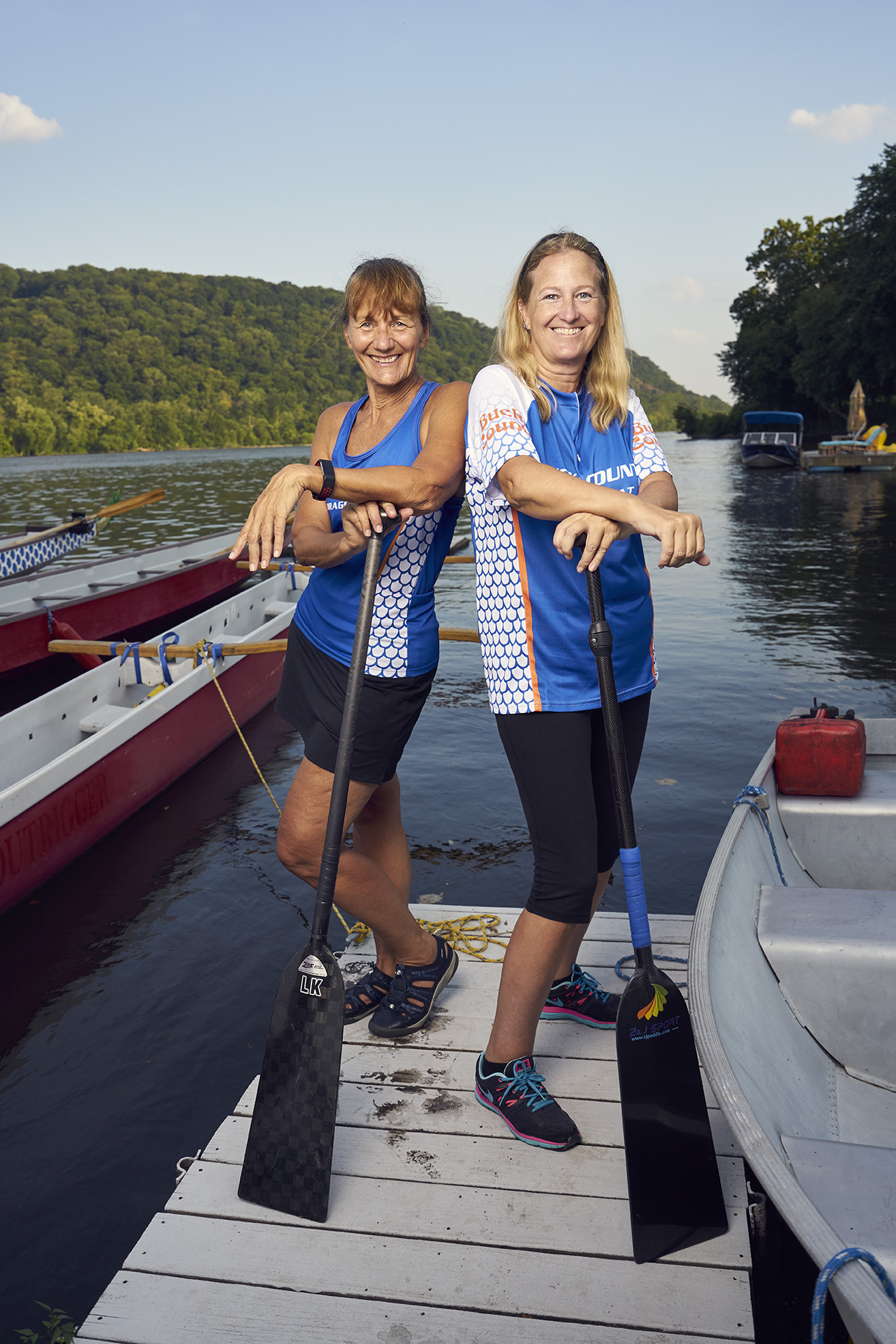
BCDBA Co-founder Laura Kent and Blazing Dragons Drummer Laurie McHugh.
Our team came together as a crew—one boat, one heartbeat—and kicked butt. And they never let up.
Raising a Dragon
Laurie McHugh and Jacquelyn Wetzel met on a community dragon boat team in 2010. They both loved the sport, but a split with the team led them to try something that would change the course of their lives. They started their own dragon boat club out of New Hope, Pa. With help from seasoned dragon boaters Gary and Laura Kent and Wetzel’s husband, Chris, CEO at Capital Health’s Surgery Center in Hamilton, NJ, they created a 501c3, and Bucks County Parks and Recreation welcomed the team to its new home on the Delaware River.
They found a dock and eventually bought their first dragon boat, Ruby Red, and before they knew it, the trio had six teams on the water. “Chris decided in our second year that he was going to have a festival. And we were told by everybody—organizers, other crews, other clubs—never have a festival until you’re at least 10 years old,” McHugh says. “They said, ‘You shouldn’t do it, and when you do have one, expect maybe 10 teams to show up if you’re lucky.’ We sold out our first year and raised more than $40,000 for local food banks.”
They received the same dubious responses when they decided to compete in the National Championship in 2015. “They told us, ‘Don’t do that; it’s going to be devastating to your club because you’re not going to win—there’s no way you can win.’ And then we went there and we won. And it became the defining moment of our program.”
While McHugh is laser-focused on running the Bucks County Dragon Boat Association and making it self-sustaining, Jacquelyn Wetzel has continued to progress as a paddler and is competing for Team USA in Kunming, China, this month for the 2017 International Dragon Boat Federation World Championships. “As soon as the horn sounds for my first race in Kunming, I will paddle like I have never paddled before and leave it all out on the water for my teammates and my country,” Wetzel says.
Big Finish
With 20 meters to go, we’re still behind Malia. But we heave and dig and smash our way forward, finding a burst of energy that sends what’s in our hearts and our guts into our bones and muscles.
That’s what it takes, and we shoot across the finish line first, by a dragon’s breath.
In real time, the race is too close to call. But we’ll soon find out that we won. Bucks County Fusion claimed its second national championship title in a row in the women’s Senior A (40 and older) division. In the space of 57 seconds and just a fraction of one indelible moment, we have become national champions of dragon boat.
We’re all in bit of a daze as we come off the boat, uncertainly high-fiving the other teams and each other, waiting for a more definitive confirmation of victory than the thumbs up we got from Chris Wetzel, vice president of the Bucks County Dragon Boat Association (BCDBA), as we approached the shore. It comes in the form of Coach Chang, who tells us in his typical measured tone that we won the race and secured enough points to win gold in the USDBF Club Crew National Championships and the ERDBA Regional Championships, as well as a trip to Hungary for the World Championship. He’s careful not to be overly exorbitant in his praise—he has his eyes set on Hungary. But among the women who make up the team, tears of joy and relief begin spilling over nonetheless. This win represents hours spent paddling up and down the Delaware River out of New Hope in rain and heat, away from our lives and loved ones. Hours of monotonous drills, demanding more from our bodies. And the emotion gets the best of us.
Sometimes team cohesion comes in the very moment when you need it the most. “During the last 200-meter race, I saw and felt the heart and soul of 22 women come together and lay it all out there,” says Deb Jennings, who sits in the key position known as stroke pair in the first row of the boat. “Each and every team member, whether they paddled or not, acted as one. It is impossible to put that feeling into words.”
“Winning together as a team makes me feel emotionally full,” says King. “For me, this win is the confirmation that my ‘Senior A’ body and mind are capable of achieving goals, even the ones that make your muscles and brain hurt. Quite honestly, it feels good to be proud of myself. I will gladly trade in 100 practice hours for those glorious hours after a win, 100 times over.”
But words matter less than actions on a dragon boat. We’ll spend the next 10 months conditioning our bodies and perfecting our technique, timing, and endurance. Then we’ll come together next year, July 17–22, in Szeged, Hungary, to dig deep into ourselves and see how far we’ve come as a team. To take our measure all over again, this time on the world’s biggest stage.
